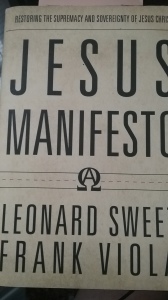
Jesus Manifesto, by Leonard Sweet and Frank Viola, includes a chapter entitled “A Collision of Two Empires.” Some wonderfully provocative verbiage appears in this chapter, and I’d like to share some of it, with some commentary. For length reasons alone, I’ll split this into two posts.
A good definition of the kingdom of God is as follows: the manifestation of God’s ruling presence. “The kingdom of God is in the midst of you,” Jesus said. In other words, Jesus was saying, “I’m standing here in your midst. I am the kingdom incarnated. Not only in what I do, but in who I am.” 107
At times it’s necessary to unlearn something before trying to learn something else. In this case: centuries of post-Constantinian experience have influenced countless millions, and it is important to move away from any geopolitical, physical-empire notions when dealing with the nature of God’s rule and reign. Above, the authors are pointing more to the manifestation of God’s reign in the person of Jesus Christ, but I thought it appropriate to comment from another vantage point.
Now to probe the main point above. (The kingdom of God ought to be discussed, meditated on, honored, and probed daily.) The expression “in the midst of you” is more typically given as “within you” or “among you.” Either rendering is worth pondering metaphysically, I suppose, but it might be that neither is actually in view in this biblical text. An intriguing bit can be found on Larry Hurtado’s blog under the title “The Kingdom of God is ‘Within your reach,'” where he suggests “at hand” and “within reach” as a supportable translations of the idiom, thereby moving away from the metaphysical.
Jesus is head over all things not for the state but for the church. All things are placed under his feet, Paul wrote, but Jesus has been appointed “head” of “all things” for the church. Some have made Jesus the chaplain of the American dream. Others have made him the chaplain of the Democratic Party. Still others have made him Jesus the chaplain of capitalism and Republicanism. All are equally blasphemous. 105-106
Some today teach that the kingdom of God is a political utopia taught by Jesus that we Christians are charged to bring about. This is essentially the old-fashioned “social gospel.” 106We must never avoid social issues. But the distinctive mark of a Christian is that you don’t begin with a social or moral issue. You begin with God. You start with God’s revelation in Jesus. . . . 107-8
Cambridge historian Eamon Duffy visited the National Gallery’s “Seeing Salvation” exhibit (2000)… The earliest symbolic representation of Christ he could find on display was the Chi-Rho monogram, encoding the opening letters of the name “Christ” in Greek. Duffy found the monogram on the reverse of a coin the emperor Constantine struck in 327, fourteen years after seizing control of the Roman Empire by force. On this coin, Christ’s name halos a war banner bearing the inscription “The hope of the State.” Duffy comments, “From the very beginning, Christian art was hijacked to serve the powerful and the successful.” 109
